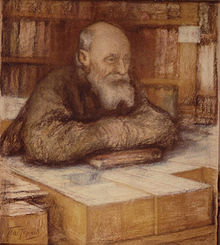Nikolai Fyodorovich Fyodorov

Nikolai Fyodorovich Fyodorov (born May 26 . Jul / 7. June 1829 greg. In Klyuchi in Tambov Governorate , † December 15 jul. / 28 December 1903 greg. In Moscow ) was a Russian philosopher.
Fyodorov was the illegitimate child of the Russian nobles Elizaveta Ivanova and Prince Pavel Gagarin. Raised in Okna with the Gagarin family, he attended school in Eack from 1836 to 1842 and then until 1849 the grammar school in Tambow . From 1849 to 1852 he studied administrative science at the Richelieu University in Odessa . There he already drafted the basic ideas of his "unsystematic philosophy". After the college, which he left without a degree, Fyodorov worked at several provincial schools as a history teacher. In 1868 he moved to Moscow, where he gave private lessons and in 1869 found a job as an assistant librarian in the Chertkow library . From 1874 to 1899 he worked as a librarian in the Rumyantsev Museum , where he was the first to compile a systematic book catalog. During the last years of his life he was a librarian in the reading room of the Moscow Archives of the Ministry of Foreign Affairs .
Fyodorov's philosophy, which can also be felt in the work of Boris Pasternak , connects Christian and philosophical concepts, including the idea of the resurrection of the body or the idea of world consciousness ( noosphere ).
Works
- Nikolaj Fedorov: The question of brotherhood or kinship, the causes of the unfraternal and unrelated, d. H. the unpeaceful state of the world and the means to restore kinship. Memorandum from the non-scholar to the learned, the spiritual and worldly, to the believers and non-believers. In: Boris Groys, Michael Hagemeister (ed.): Die Neue Menschheit. Biopolitical utopias in Russia at the beginning of the 20th century. Frankfurt am Main: Suhrkamp 2005 (stw 1763), pp. 70–126.
- Nikolaj Fedorov: The museum, its meaning and its purpose. In: Ibid., Pp. 127-232.
- NFFyodorov. The Philosophy of the Common Task. The texts on English.
literature
- Michael Hagemeister : Nikolaj Fedorov. Studies on life, work and impact . Sagner, Munich 1989, ISBN 3-87690-461-7 (also dissertation, University of Marburg 1989) [1]
- Michael Hagemeister: "Our body must be our work." Mastery of nature and overcoming death in Russian projects of the early 20th century , in: Boris Groys, Michael Hagemeister (ed.): Die Neue Menschheit. Biopolitical utopias in Russia at the beginning of the 20th century . (= stw; 1763). Suhrkamp, Frankfurt am Main 2005, ISBN 3-518-29363-X , pp. 19-67
- Michael Hagemeister: Nikolaj Fedorov and the "Russian Cosmism", in: Franz Josef Klehr & Eberhard Müller, ed .: Russian religious philosophy. The legacy regained: appropriation and distance . Stuttgart 1992 (series: Hohenheimer Protocols, 41), pp. 159–170
- Michael Hagemeister: Fedorov, Nikolaj Fedorovic. In: Biographisch-Bibliographisches Kirchenlexikon (BBKL). Volume 21, Bautz, Nordhausen 2003, ISBN 3-88309-110-3 , Sp. 381-386.
- Wolfgang Heller: Fedorov, Nikolaj Fedorovič. In: Biographisch-Bibliographisches Kirchenlexikon (BBKL). Volume 17, Bautz, Herzberg 2000, ISBN 3-88309-080-8 , Sp. 360-366.
- Frank Haney: Russian Cosmism and European Science, in Erhard Hexelschneider, Ed .: Russia & Europe. Historical and cultural aspects of a problem of the century. Jena Forum for Education and Science, Leipzig 1995, ISBN 3929994445 , pp. 207–224
Web links
- Literature by and about Nikolai Fjodorowitsch Fjodorow in the catalog of the German National Library
- R. Michael Perry: Nikolai Fedorovich Fedorov (1829-1903). In: Internet Encyclopedia of Philosophy .
| personal data | |
|---|---|
| SURNAME | Fyodorov, Nikolai Fyodorovich |
| BRIEF DESCRIPTION | Russian philosopher |
| DATE OF BIRTH | June 7, 1829 |
| PLACE OF BIRTH | Klyuchi, Tambov Governorate |
| DATE OF DEATH | December 28, 1903 |
| Place of death | Moscow |